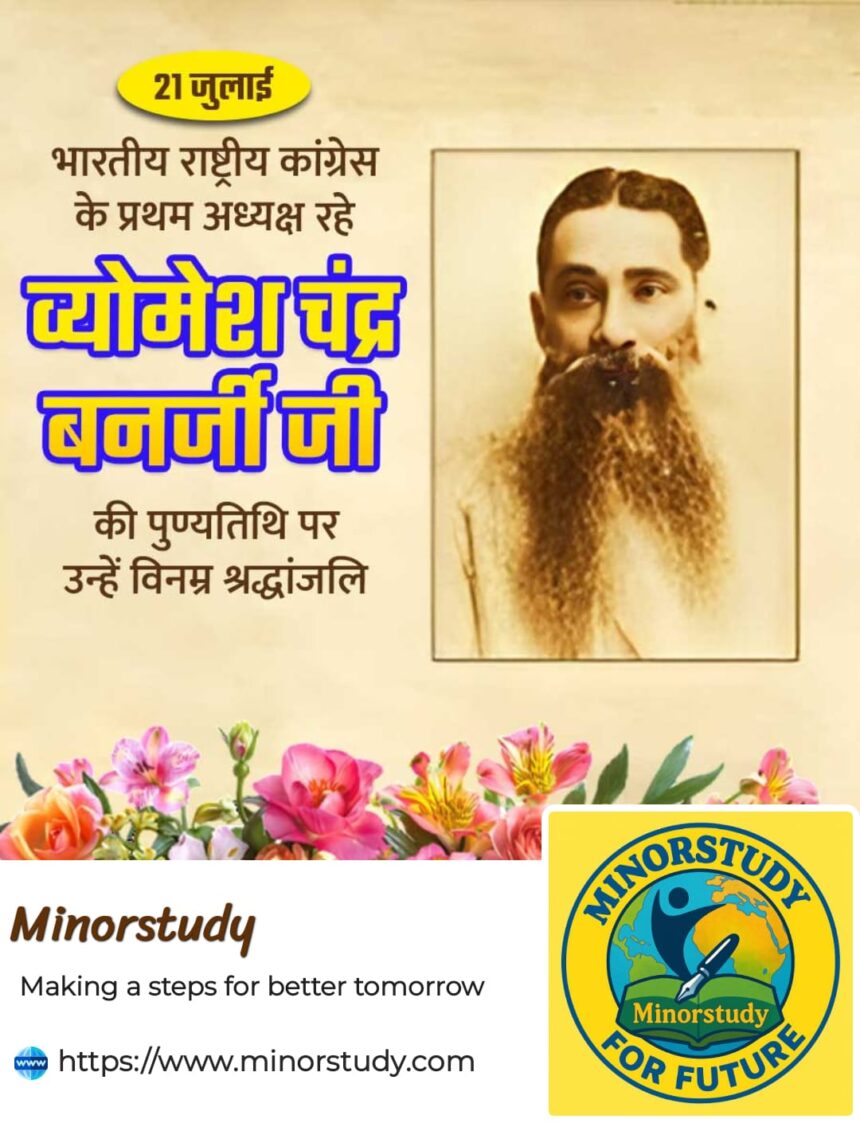🇮🇳 7 Powerful Truths About Vyomesh Chandra Banerjee That Still Inspire Modern India
India’s freedom journey is filled with known and lesser-known heroes whose impact echoes across time. One such trailblazing intellectual, legal luminary, and patriotic reformist was Vyomesh Chandra Banerjee — a name that might not echo daily in the common narrative but laid foundational stones in India’s political and intellectual resurgence.
- 🧬 Who Was Vyomesh Chandra Banerjee?
- 🕰️ Timeline of Vyomesh Chandra Banerjee’s Life
- 📚 7 Powerful Facts About Vyomesh Chandra Banerjee
- 📌 Why Vyomesh Chandra Banerjee Still Matters Today
- 🙋 FAQs About Vyomesh Chandra Banerjee
- Q1: Was Vyomesh Chandra Banerjee a freedom fighter?
- Q2: What was his role in Indian National Congress?
- Q3: Was he ever in prison like other leaders?
- Q4: What are some of his literary or legal works?
- Q5: Why is he not as popular today?
- 🪔 Significance in India’s History
- 🌺 Remembering and Wishing: Homage to a Founding Torchbearer
- 📅 Observance and Cultural Reverence
- 🧭 Important Points to Remember
- 🌿 Daily Life Impact and Why He Matters Now
- 🏁 Conclusion: Quiet Strength That Shaped a Nation
Let’s rediscover Vyomesh Chandra Banerjee Ji, the first President of the Indian National Congress, a pioneer lawyer, and a symbol of constitutional nationalism. In this article, you’ll find history, timeline, contributions, significant facts, FAQs, legacy, impact, human reflections, and more — written with heart, respect, and relevance.
🧬 Who Was Vyomesh Chandra Banerjee?
Vyomesh Chandra Banerjee (V. C. Banerjee) was born on 29 December 1844 in Calcutta (Kolkata) during British India. He rose to become one of India’s first prominent barristers, a public intellectual, and a co-founder of the Indian National Congress (INC).
His Claim to Immortality in Indian History:
First President of the Indian National Congress in 1885
Advocate of moderate, constitutional methods for Indian self-rule
Among the earliest Indian voices in legal reform, civil rights, and political unity
His life embodies a mix of wisdom, integrity, diplomacy, and uncompromising patriotism—delivered with gentlemanly grace and unshaken commitment.
🕰️ Timeline of Vyomesh Chandra Banerjee’s Life
| Year | Milestone |
|---|---|
| 1844 | Born in Calcutta, British India |
| 1862 | Graduated from Presidency College |
| 1864 | Moved to England, studied law at Middle Temple |
| 1867 | Returned to India as a Barrister-at-law |
| 1870s–80s | Became a leading lawyer in Calcutta High Court |
| 1885 | Elected First President of the Indian National Congress |
| 1886–1900 | Promoted constitutional political reforms and Indian civil rights |
| 1906 | Passed away, leaving behind a rich legal and political legacy |
📚 7 Powerful Facts About Vyomesh Chandra Banerjee
🏛 First-Ever President of INC
In December 1885, he chaired the first session of the Indian National Congress in Bombay, setting the tone for decades of democratic struggle.⚖️ Pioneer Indian Barrister
Among the first Indians called to the Bar in England, he challenged racial prejudice in British legal circles through sheer intellect and excellence.📢 Voice for Unity Over Division
Banerjee advocated Hindu-Muslim unity, urging political cooperation without religious segregation—a rare and bold call in his time.🧠 Moderate Nationalist Leader
He promoted constitutional and peaceful dialogue with the British, preferring petitions and legal arguments to revolt—a philosophy later adopted by early Congress leaders.🗣️ Fierce Advocate of Civil Rights
He consistently demanded equal treatment of Indians in administration, education, and judiciary—influencing early reforms in the British Raj.📖 Scholar and Reformer
He was deeply influenced by western liberal thought yet remained rooted in Indian values, balancing reform with cultural respect.🌍 Internationally Respected
Banerjee’s dignified speech and character gained admiration in both India and England, making him one of the first Indian leaders respected abroad.
📌 Why Vyomesh Chandra Banerjee Still Matters Today
In the fast-paced, often polarizing world of modern politics, Banerjee’s legacy reminds us of the power of intellect over aggression, dialogue over division, and principle over populism.
He believed:
Politics should be a service, not a business
Law is a vehicle for justice, not manipulation
Unity in diversity is not a slogan—it’s survival
🙋 FAQs About Vyomesh Chandra Banerjee
Q1: Was Vyomesh Chandra Banerjee a freedom fighter?
Yes, in the constitutional and political sense. He was among the earliest nationalists, advocating civil and legal reforms rather than revolutionary tactics.
Q2: What was his role in Indian National Congress?
He chaired the first-ever INC session in 1885, helping frame the organization’s moderate objectives—a moment that kickstarted India’s organized freedom movement.
Q3: Was he ever in prison like other leaders?
No. His mode of politics was moderate, legalistic, and non-confrontational, and he was respected by even the British authorities.
Q4: What are some of his literary or legal works?
While he didn’t publish extensively, his courtroom arguments, parliament-style speeches, and Congress proceedings have been documented and referenced in Indian political history.
Q5: Why is he not as popular today?
Because later revolutionary phases of the freedom movement overshadowed the early constitutional era, where leaders like Banerjee laid the groundwork.
🪔 Significance in India’s History
Foundation Builder: Without Banerjee’s moderate beginnings, INC might not have evolved into the mass movement it later became under Gandhi.
Legal Luminary: He set high ethical standards in law, influencing future generations of Indian jurists.
Cultural Ambassador: His fusion of Indian ethos and British legal tradition helped reshape colonial administrative attitudes.
🌺 Remembering and Wishing: Homage to a Founding Torchbearer
🕯️ “On the birth anniversary of Vyomesh Chandra Banerjee Ji, we bow in gratitude to a man who built bridges of law and dialogue when others chose silence or rebellion. His pen and presence changed India’s course—let us never forget.”
📅 Observance and Cultural Reverence
While there is no national holiday in his name, his legacy is honored:
During INC foundation celebrations on December 28
In law colleges and civic platforms recognizing Indian legal pioneers
Among historians exploring pre-Gandhian nationalism
🧭 Important Points to Remember
📌 First Indian National Congress President (1885)
📌 One of India’s first legal professionals trained in England
📌 Advocated peaceful civil reform
📌 Promoted Hindu-Muslim unity and justice-based governance
📌 Influenced early legal-political culture in India
🌿 Daily Life Impact and Why He Matters Now
Vyomesh Chandra Banerjee’s philosophy is highly relevant in today’s India where:
Legal institutions are under stress
Politics needs ethical guidance
Social unity is under challenge
For youth, educators, lawyers, and politicians, his life is a reminder of how brilliance, balance, and boldness can transform societies without chaos or confrontation.
🏁 Conclusion: Quiet Strength That Shaped a Nation
Vyomesh Chandra Banerjee’s story is not just about being “first” but about being right, wise, and visionary.
He didn’t fight wars.
He didn’t make speeches to incite.
He simply built a path—one of law, dignity, and political vision.
In an India constantly striving to balance progress with principle, his life remains a map and a mirror—a legacy that doesn’t shout but shines quietly.









Howdy! I simply would like to give an enormous thumbs up for the nice data you could have here on this post. I can be coming back to your blog for more soon.